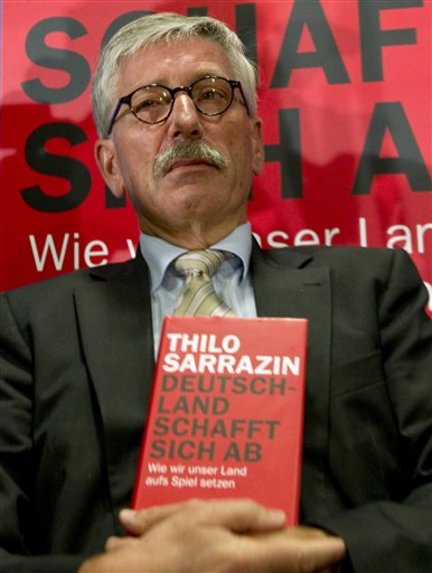
Thilo Sarrazin was a rather unremarkable, if efficient and effective, bureaucrat and administrator in a number of German government ministries and large businesses up until 2010. At the end of August, 2010 his book Deutschland schafft sich ab (“Germany Is Abolishing Itself”) was released and caused a firestorm. The book highlighted the current demographic problem facing Germany with immigrant groups having high birth rates and not assimilating and the native population having a declining population and birth rate. The book particularly singled out Muslim groups such of Turks and Arabs who Sarrazin shows through heavy use of statistics are not assimilating, are not being productive, are a drain on social programs, and are poised to take possession of Germany by sheer weight of numbers in several generations. The book is by no means an ethnonationalist piece and would be considered by many in America to be rather mild and tame as Sarrazin mainly uses nebulous “western enlightenment values”, achievement gaps, and economics as a basis for his criticism and welcomes immigration of other non-white groups who assimilate better into German society. His main solutions involve incentives for Germans to have more children, decreasing government handouts, and restricting immigration from non-assimilateable groups.
With Germany probably being the most repressive country in the soft totalitarianism tradition of the post-WWII West in regards to politically incorrect ideas, it was a shock to many that a successful figure like Sarrazin would publish a book taking such positions. Still more surprising is that Sarrazin is a lifelong member of the center-left Social Democrat party (SPD) who are definitely not immigration restrictionists in the least. Sarrazin was quickly branded as an evil racist by much of the German press, lost his job at the Deutsche Bundesbank, and came close to being kicked out of the SPD. In fact, he only managed stay a member by releasing a statement in effect saying that, while he was unrepentant about what he wrote, he most certainly does not hold to many of the logical conclusions and solutions to the problems he pointed out.1 Why he wanted to remain a SPD member is beyond me, but that’s beside the point.
Despite this smear campaign, the book has sold over 1.5 million copies so far, making Sarrazin the most widely read German language author of the last decade; not a small accomplishment for such a taboo subject in a country of 82 million.2 The book has caused a national debate on the subject of immigration and national identity; questions which have been firmly suppressed in Germany since the end of WWII. Polls show that over 50% of Germans agree with Sarrazin on the subject and 18% are willing to support him should he seek to launch a new political party.3
Capitalizing on the success of his first book, Sarrazin released a new book a week ago entitled Europa braucht den Euro nicht (“Europe doesn’t need the Euro”). Perfectly timed to take full advantage of the ongoing Euro crisis, Sarrazin makes the case that the Euro is merely a mechanism by which southern European countries take advantage of stronger northern European countries’ economies to get cheap government loans. He points to the German national guilt over WWII as preventing Germany from acting in its own best interest in this matter; a thesis which is sure to draw just as much fire as his immigration restrictionism does. Sarrazin says that the Euro was a bad idea to begin with and should be done away with now. I expect sales to be just as high for this book as his first.
It’s hard to find a comparison in America for Sarrazin as most of the books written by American politicians range from bland to horrible. Pat Buchanan might come the closest as a national politician who successfully transferred over to best selling author touching on politically incorrect topics. Unfortunately Sarrazin’s books have not been translated into English yet, but I strongly suspect that, should that happen, Buchanan and Sarrazin would be sharing many of the same bookshelves in the Anglosphere.
Germany still has a long way to go to get to healthy ethnonationalism, but Sarrazin’s books and their reception are a hopeful sign that there are holes in the politically correct dike.
Footnotes
| Tweet |
|
|
|




